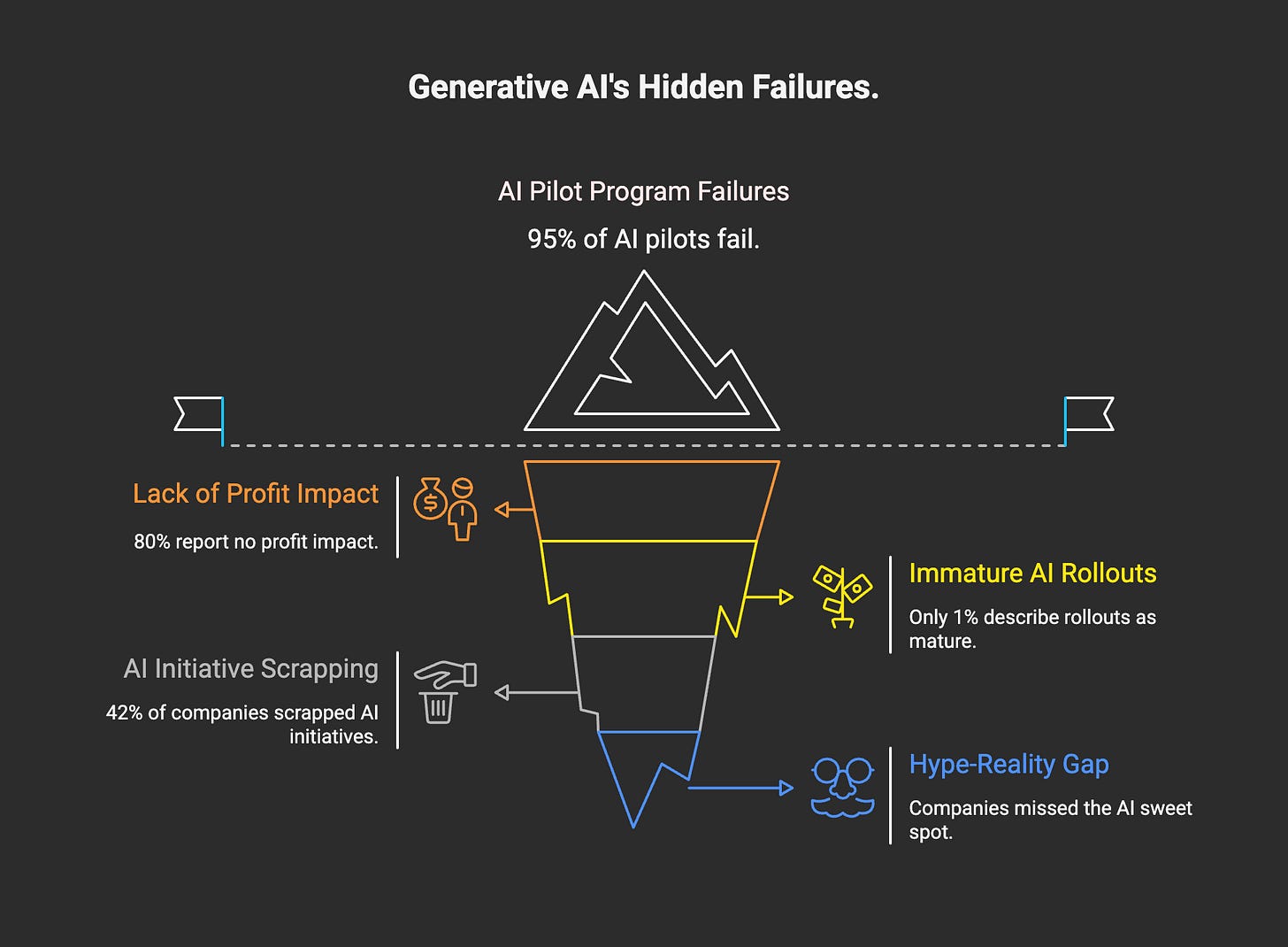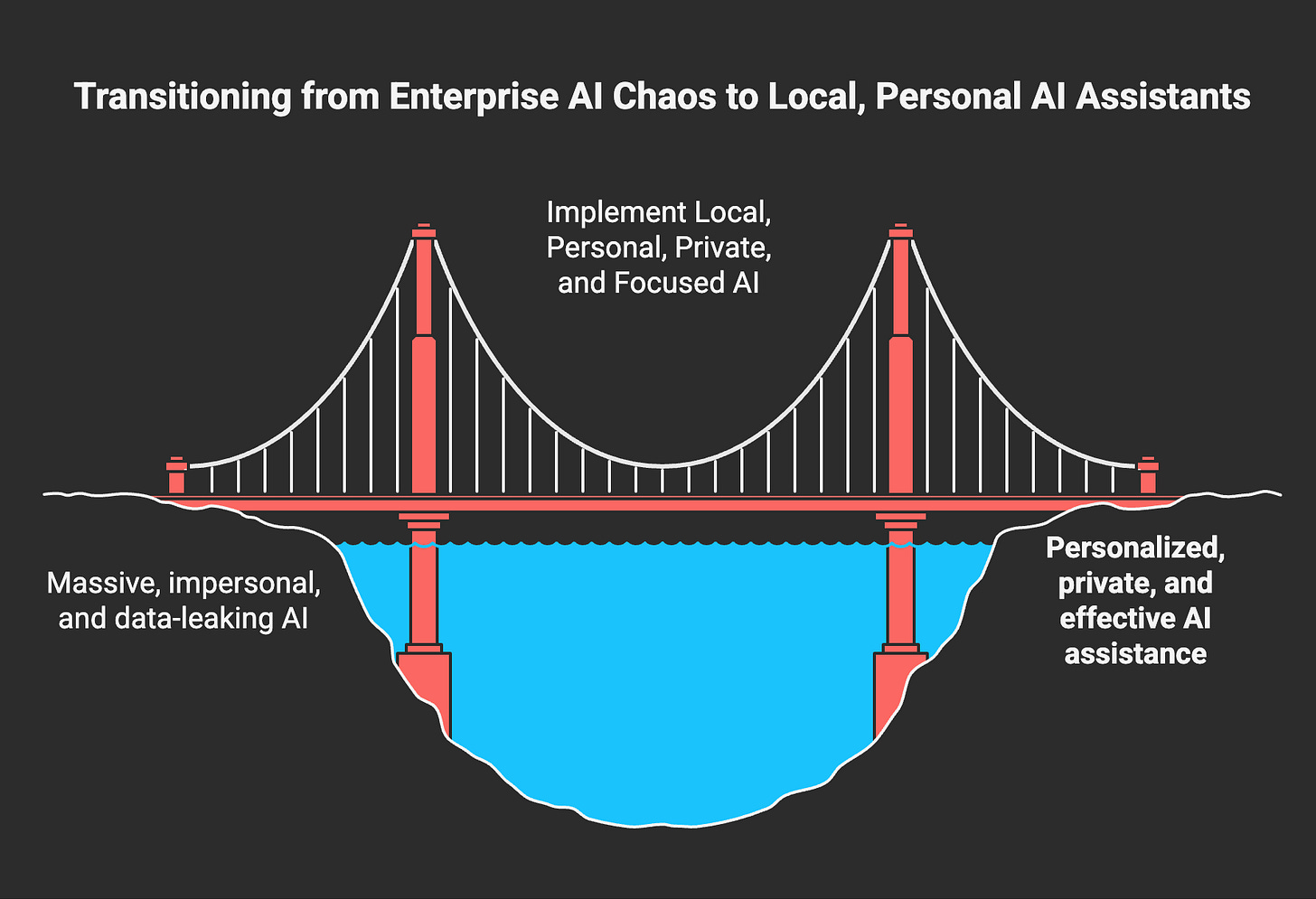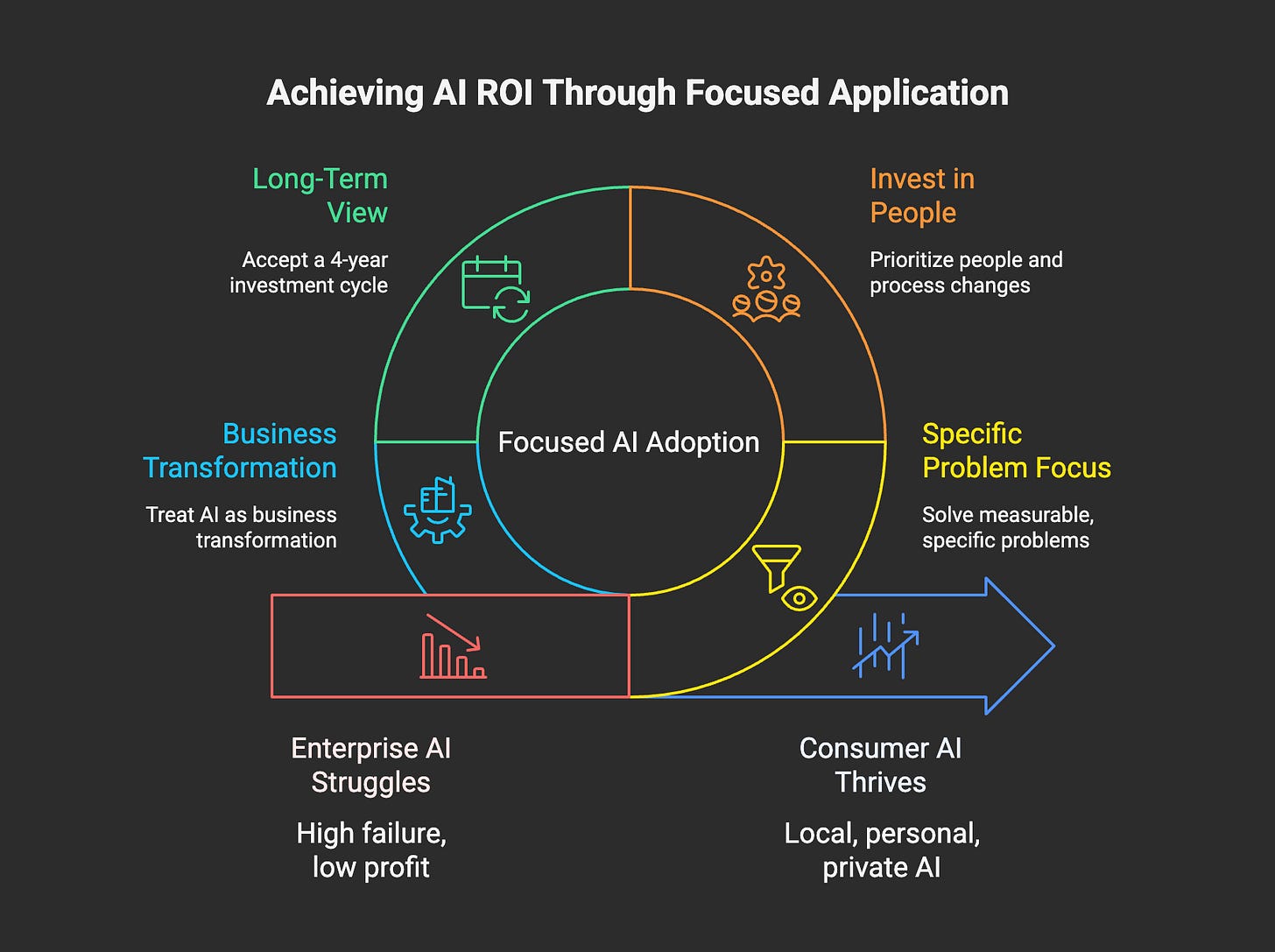The AI ROI Reality Check: Why 95% of Companies Are Getting It Wrong
(And What The Data Actually Shows)
Hey digital adventurers! Okay, so remember how I mentioned hearing scattered reports about AI not actually boosting company revenues? Well, I went down the rabbit hole and the data is absolutely WILD. Like, not just "oh that's interesting" wild, but "holy crap, we need to talk about this immediately" wild.
After diving deep into reports from McKinsey, MIT, BCG, Gartner, and basically every major consulting firm and research institution, I've got some numbers that are going to make you rethink everything you thought you knew about AI in business. Buckle up, because this is going to be a ride.
The Numbers That Made Me Spit Out My Coffee
Here's the headline that should be on every business magazine cover but somehow isn't: 95% of generative AI pilot programs are failing to achieve rapid revenue acceleration. NINETY-FIVE PERCENT. That's not a typo, that's MIT research based on 150 executive interviews and 350 employee surveys.
But wait, it gets better (or worse, depending on how you look at it). Despite $109.1 BILLION in U.S. private AI investment in 2024 alone, 80% of organizations report no tangible enterprise-level profit impact from their AI initiatives. McKinsey surveyed 1,491 participants across 101 countries and found that while 71% of organizations are regularly using generative AI, only 1% - ONE PERCENT - describe their rollouts as "mature."
I'm sitting here looking at these numbers thinking... this is like watching everyone jump off a cliff because they heard there was gold at the bottom, but 95% of them are just hitting rocks.
The Hype Versus Reality Gap Is INSANE
Remember when I wrote about finding the AI sweet spot and when to use AI versus when to run away? Turns out most companies missed that memo entirely. They're throwing money at AI like it's some magic revenue generator, but the data shows something completely different.
Here's what's actually happening: S&P Global Market Intelligence reports that 42% of companies scrapped most of their AI initiatives in 2024, up from just 17% the previous year. The abandonment rate is ACCELERATING. Companies are realizing their AI projects aren't just failing to deliver - they're actively failing faster than ever.
But here's where it gets really interesting... and this is where my prediction about local models comes in. The companies that ARE succeeding? They're not just throwing ChatGPT at everything and hoping for the best. They're building thoughtful, integrated systems that actually solve real problems.
The Winners Are REALLY Winning Though
Now, before you think AI is completely overhyped (which, let's be honest, it kind of is), the small percentage of companies that are getting it right are absolutely crushing it. IDC found that while average companies see 3.7x ROI from generative AI investments, AI leaders achieve 10.3x ROI - nearly three times better results.
That's not a small difference. That's the difference between "eh, this is okay" and "holy crap, we need to do more of this immediately."
What are these companies doing differently? Well, after diving through all this research, it's not what you'd expect. 70% of their investment goes to people and processes, 20% to technology and infrastructure, and only 10% to the actual algorithms. Most companies are doing the exact opposite - they're buying fancy AI tools and expecting magic to happen.
This reminds me of when I was building apps with AI and realized the hardest part wasn't the AI - it was figuring out what problem I was actually trying to solve and how to integrate the solution into real workflows.
The Productivity Gains Are Real, But...
Here's what's driving me crazy about all this... the task-level productivity improvements from AI are absolutely real and documented. Academic studies consistently show 10-40% productivity gains for specific functions:
Customer service: 14% average improvement (34% for novice workers)
Management consulting: 25% faster completion with 40% higher quality
Software development: 56% faster task completion
Professional writing: 8-36% productivity improvements
I've experienced this firsthand when I was experimenting with AI hallucinations as a creative tool. The AI wasn't replacing my thinking - it was amplifying it, helping me explore ideas I wouldn't have considered.
But here's the thing... individual productivity gains don't automatically translate to enterprise revenue. It's like having a really fast car but no idea where you're driving. The speed is real, but if you're going in circles, you're not getting anywhere.
Why Manufacturing Should Terrify Everyone
MIT did this absolutely fascinating longitudinal study of tens of thousands of manufacturing companies, and the results should scare every executive planning an AI rollout. Companies experienced an initial 1.33 percentage point productivity DECLINE upon AI adoption. When they corrected for selection bias, that became a 60 percentage point decline.
Sixty. Percent. Decline.
The companies that stuck with it eventually saw massive gains after 4+ years, but think about that timeline. Four years of potential disruption before you see the benefits. How many companies are prepared for that kind of investment cycle?
This is exactly why I believe consumer-facing AI will thrive when we manage to create reliable local models. Privacy and personalization are still way behind where they need to be, but more importantly, local models could eliminate a lot of this organizational complexity. When AI runs on your device, solving YOUR specific problems, you skip the enterprise transformation nightmare.
The Privacy and Personalization Angle Everyone's Missing
Speaking of local models... here's why I think this whole enterprise AI struggle is going to accelerate the move to consumer AI that actually works. Look at the barriers companies are hitting:
57-76% struggle with data security concerns
43-48% have basic data quality issues
46% can't find people with the right skills
8 months average implementation time
13 months to see value realization
But imagine if instead of trying to implement enterprise-wide AI transformation, your AI just lived on your computer, learned from YOUR work patterns, and solved YOUR specific problems. No enterprise data security nightmare. No organizational change management. No waiting for IT to approve your AI tool budget.
I've been thinking about this ever since I built that dynamic Claude chat system. The magic wasn't in the enterprise features - it was in creating something that understood my specific workflow and adapted to how I actually work.
Sector Performance Is All Over The Map
The research shows massive variation across industries, which honestly makes sense if you think about it:
Financial services are killing it with 4.2x ROI - probably because they're already data-driven and have clear metrics.
Healthcare is exploding - market size went from $15.4 billion in 2022 to $32.3 billion in 2024. That's 42% annual growth. Medical documentation that used to take an hour now takes 15 minutes.
Manufacturing is struggling hard despite 89% planning AI integration, only 16% are meeting implementation goals.
Construction is basically ignoring AI with only 4% adoption rates.
This tells me we're still in the very early stages of figuring out where AI actually belongs. It's not a universal solution - it's more like electricity was in the early 1900s. Some industries figured out how to use it quickly, others took decades.
What This Means for Individual Creators and Small Businesses
Here's what gets me excited about all this data... while big enterprises are struggling with AI transformation, individual creators and small businesses have a massive advantage. We don't have to deal with:
Enterprise data security bureaucracy
Organizational change management
Legacy system integration
Executive committee approval processes
Remember when I wrote about building internal digital solutions fast? This is exactly what I was talking about. Small, focused AI applications that solve specific problems without trying to transform entire organizations.
I've been using AI in my workflow for months now - everything from content ideation to automating my knowledge management systems. The key isn't trying to revolutionize everything at once. It's finding those specific pain points where AI can make an immediate, measurable difference.
The Future Is Local, Personal, and Private
All this enterprise AI chaos is actually reinforcing my belief that the future of consumer AI is going to be radically different. Instead of companies trying to implement massive AI transformation projects, we're heading toward a world where AI is:
Local: Running on your devices, not in corporate clouds
Personal: Learning from your specific patterns and preferences
Private: Your data never leaves your control
Focused: Solving specific problems rather than trying to do everything
The technology is almost there. Models like Llama and Phi are getting smaller and more capable. Hardware is getting more powerful. The missing piece isn't technological - it's realizing that maybe we don't need enterprise AI transformation at all.
Maybe we just need really smart personal assistants that understand our individual workflows and help us be more effective in our specific contexts.
The Reality Check We All Need
Look, I'm not anti-AI. Obviously. I've built multiple AI-powered tools, written extensively about AI's practical applications, and genuinely believe this technology is transformational.
But these numbers are a massive reality check. 95% failure rate for enterprise AI pilots. 80% of companies seeing no profit impact despite billions in investment. These aren't rounding errors - these are systematic problems with how we're approaching AI adoption.
The companies that are succeeding aren't doing it by throwing more money at fancier AI tools. They're succeeding by:
Starting with specific, measurable problems
Investing heavily in people and process changes
Taking a long-term view (remember that 4-year timeline)
Treating AI as business transformation, not technology deployment
For those of us not running Fortune 500 companies, this is actually great news. We can skip all the enterprise complexity and go straight to building AI tools that solve our specific problems. We can experiment, fail fast, and iterate without needing committee approval.
Where I Think This Is All Heading
Based on everything I'm seeing in the data and my own experiments, here's my prediction:
Enterprise AI will continue struggling for the next 2-3 years as companies slowly learn that AI adoption requires fundamental organizational change, not just technology deployment.
Consumer AI will explode as local models become more capable and privacy-focused solutions eliminate the need for enterprise data governance complexity.
The real winners will be small businesses and individual creators who can adopt AI tools quickly without organizational overhead, focusing on practical applications rather than trying to transform entire companies.
AI will become more specialized and context-specific rather than trying to be general-purpose magic. Think less "AI that does everything" and more "AI that's really good at this one thing you do all the time."
This is why I keep experimenting with tools like Claude Desktop MCP and building custom automation systems. The future isn't about waiting for some company to build the perfect AI solution for your industry. It's about building exactly what you need for your specific workflow.
The Bottom Line
The AI revolution is happening, but it's not happening the way most people think. Enterprise AI transformation is proving incredibly difficult and expensive, with most companies failing to see meaningful returns.
But that doesn't mean AI isn't valuable. It means we're approaching it wrong. Instead of trying to transform entire organizations, we should be focusing on solving specific problems with focused, practical applications.
The future of AI isn't going to be about massive enterprise platforms. It's going to be about personal, private, local tools that understand your specific needs and help you work more effectively.
And honestly? That future sounds way more exciting to me than waiting for some Fortune 500 company to figure out how to get ROI from their billion-dollar AI transformation project.
PS. How do you rate today's email? Leave a comment or "❤️" if you liked the article - I always value your comments and insights, and it also gives me a better position in the Substack network.






Generative AI became a synonym with "All things AI" so fast that a lot of companies might've forgotten other proven implementations of AI like predictive maintenance, anomaly detection, forecasting, CV for QA, etc. By chasing the newest shiny object.
That Golden Gate diagram is dope btw.